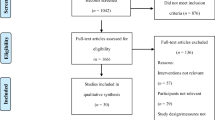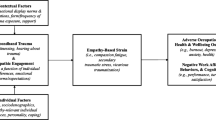Abstract
The distinct definition of stress postulated by Buddhist and Western cultures is the foundation for their different coping styles, traditions, and practices. Dukkha, derived from Buddha’s Four Noble Truths, appears on the surface similar to psychological stress. Further examination of the Eastern cosmology yields a fundamental disagreement between Western psychological theory and Buddhists’ conception of suffering and stress related to incorporating reality into the formulation. Cross-cultural research on traditional approaches to coping with occupational stress found that problem solving was the most effective strategy, however in Thailand meditation helped nurses cope with a variety of stressors such as dealing with death and dying.


Similar content being viewed by others
References
Aldwin, C. M. (1994). Stress, coping, and development: An integrative perspective. New York: Guilford Press.
Amirkhan, J. H. (1990). A factor analytically derived measure of coping: The coping strategy indicator. Journal of Personality and Social Psychology, 59, 1066–1074.
Benson, H. (1997). Timeless Healing. New York: Fireside Books.
Bhagat, R. S., O’Driscoll, M., Babakus, E., Frey, L., Chokkar, J., Ninokumar, B., Pate, L., Ryder, P., Fernandez, M., Ford, D., & Mahanyele, M. (1994). Organizational stress and coping in seven national contexts: A cross-cultural investigation. In G. P. Keita, & J. J. Hurrell (Eds.) Job stress in a changing workforce (pp. 93–105). Washington, DC: American Psychological Association.
Bond, M. (1991). Beyond the Chinese face. Hong Kong: Oxford University Press.
Davidson, R. J., Kbat-Zinn, J., Schumacher, J., Rosenkrank, M., Muller, D., & Santorelli, S. F. (2003). Alterations in brain and immune function produced by mindfulness meditation. Psychosomatic Medicine, 65, 564–570.
Deikman, A. (1982). The observing self: Mysticism and psychotherapy. Boston: Beacon Press.
Fontaine, K. L. (2005). Complementary & alternative therapies for nursing practice. Upper Saddle River, NJ: Pearson Prentice Hall.
Gall, T. L., Charbonneau, C., Clarke, N. H., Grant, K., Joseph, A., & Shouldice, L. (2005). Understanding the nature and role of spirituality in relation to coping and health. Canadian Psychology, 46, 88–104.
Gethin, R. (1998). The foundations of Buddhism. New York: Oxford University Press.
Goleman, D. (1997). Healing emotions: Conversations with the Dalai Lama on mindfulness, emotions, and health. Boston: Shambhala Publications.
Guenther, H. V. (1976). Philosophy and Psychology in the Abhidharma. Berkeley: Shambhala Publications.
Hogg, M. A., & Cooper, J. (2003). The Sage handbook of social psychology. London: Sage Publications.
Lazarus, R. S. (1966). Psychological stress and the coping process. New York: Addison-Wesley.
Lazarus, R. S. (1993). Coping theory and research: Past, present, and future. Psychosomatic Medicine, 55, 234–247.
Lazarus, R. S., & Folkman, S. (1984). Stress, appraisal, and coping. New York: Springer.
Lambert, V. A., Lambert, C. E., & Ito, M. (2004a). Workplace stressors, ways of coping and demographic characteristics as predictors of physical and mental health of Japanese hospital nurses. International Journal of Nursing Studies, 41, 85–97.
Lambert, V. A., Lambert, C. E., Itano, J., Inouye, J., Kim, S., Kuniviktikul, W., Sitthimongkol, Y., Pongthavornkamol, K., Gasemgitvattana, S., & Ito, M. (2004b). Cross-cultural comparison of workplace stressors, ways of coping and demographic characteristics as predictors of physical and mental health among hospital nurses in Japan, Thailand, South Korea and the USA (Hawaii). International Journal of Nursing Studies, 41, 671–684.
Omvedt, G. (2003). Buddhism in India: Challenging Brahmanism and caste. New Delhi, India: Sage Publications.
Pongruengphant, R., & Tyson, P. D. (1997). Coping strategies, stress, and job satisfaction in Thailand’s hospital nurses. Bangkok, Thailand: Siam Press.
Pongruengphant, R., & Tyson, P. D. (2000). When nurses cry: Coping with occupational stress in Thailand. International Journal of Nursing Studies, 37, 535–539.
Rahula, W. (1959). What the Buddha taught. New York: Grove Press.
Schnurr, P. P., & Green, B. L. (2004). Trauma and health: Physical health consequences of exposure to extreme stress. Washington, D.C.: American Psychological Association.
Selye, H. (1976). Stress in health and disease. Boston: Butterworth.
Tyson, P. D. (1982). A general systems theory approach to consciousness, attention, and meditation. Psychological Record, 32, 491–500.
Tyson, P. D., & Pongruengphant, R. (1996). Avoidance as a coping strategy for nurses in Thailand. Psychological Reports, 79, 592–594.
Tyson, P. D., & Pongruengphant, R. (2004). Five-year follow-up study of stress among nurses in public and private hospitals in Thailand. International Journal of Nursing Studies, 41, 247–254.
Tyson, P. D., Pongruengphant, R., & Aggarwal, B. (2002). Coping with organizational stress among hospital nurses in Southern Ontario. International Journal of Nursing Studies, 39, 453–459.
Webber, M. (2000). Why meditate? A heart song of vast release. Kinmount, Canada: Bodhi Publishing.
Wilhelm, H., & Baynes, C. F. (1967). The I Ching or book of changes. Princeton, NJ: Princeton University Press.
Acknowledgement
The authors appreciate the detailed commentary on this paper and insights provided by Mark Webber teacher of Buddhist Dharma who studied with Namgyal Rinpoche.
Author information
Authors and Affiliations
Corresponding author
Additional information
Paul Tyson Ph.D is a professor of psychology and teaches perception, Western and Eastern consciousness at Brock University, St. Catharines, Ontario, Canada L2S 3A1. His research publications have ranged from lucid dreams to memory enhancement after drinking alcohol, but his primary focus has been on EEG biofeedback, stress management, and current cross-cultural publications are on how Buddhists cope with stress. Correspond with Paul Tyson via e-mail at tyson@brocku.ca
Rana Pongruengphant R.N., Ph.D. is an associate professor in the Faculty of Nursing and Vice-President for Academic Affairs at Burapha University, Bangsaen, Chonburi, Thailand 20131. She teaches nursing administration, nursing research and computers for research. Her publications ranged from nursing administration, nursing practice, nursing education, and cross-cultural studies of coping with occupational stress.Correspond with Rana Pongruengphant via e-mail at rena@bucc.ac.th
Rights and permissions
About this article
Cite this article
Tyson, P.D., Pongruengphant , R. Buddhist and Western perspectives on suffering, stress, and coping. J Relig Health 46, 351–357 (2007). https://doi.org/10.1007/s10943-006-9104-z
Received:
Accepted:
Published:
Issue Date:
DOI: https://doi.org/10.1007/s10943-006-9104-z




